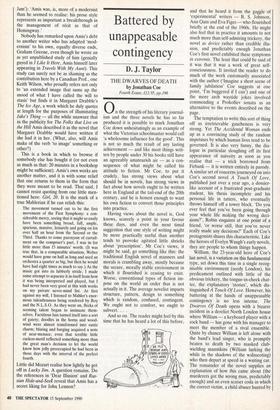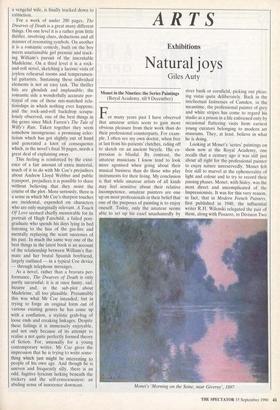Battered by
unappeasable contingency
D. J. Taylor
THE DWARVES OF DEATH by Jonathan Coe
Fourth Estate, £12.95, pp.198
0 n the strength of his literary journal- ism and the three novels he has so far produced it is possible to mark Jonathan Coe down unhesitatingly as an example of what the Victorian schoolmaster would call 'a wholesome influence for the good'. This is not so much the result of any lasting achievement — and like most things writ- ten by people under 30 his books still have an agreeably amateurish air — as a con- sequence of what might be called his attitude to fiction. Mr Coe, to put it crudely, has strong views about what should be in novels, has strong views in fact about how novels ought to be written here in England at the tail-end of the 20th century, and he is honest enough to want his own fiction to convert those principles into practice.
Having views about the novel is, God knows, scarcely a point in your favour these days, and even the most timid suggestion that one style of writing might be more practically useful than another tends to provoke agitated little shrieks about 'prescription'. Mr Coe's views, it might be said, go something like this: the traditional English novel of manners and morals is crumbling away, mostly because the secure, morally stable environment in which it flourished is ceasing to exist. Worse, conventional types of fiction im- pose on the world an order that is not actually in it. The average novelist imparts structure, pattern, design to something which is random, confused, contingent. We ought not to comfort, we ought to subvert. . . .
And so on. The reader might feel by this time that he has heard a lot of this before,
and that he heard it from the gaggle of `experimental' writers — B. S. Johnson, Ann Quin and Eva Figes — who flourished briefly at the end of the 1960s. He might also feel that in practice it amounts to not much more than self-admiring trickery, the novel as device rather than credible illu- sion, and predictably enough Jonathan Coe's first novel exhibited these symptoms in extremis. The least that could be said of it was that it was a work of great self- consciousness. It invited the reader to do much of the work customarily associated with the author (Imagine a short scene of family jubilation' Coe suggests at one point, `I'm buggered if I can') and one of the more arch wayside jokes involved commending a Prokofiev sonata as an alternative to the events described on the page.
The temptation to write this sort of thing off as irretrievable gaucheness is very strong. Yet The Accidental Woman ends up as a convincing study of the random impetuses by which human lives tend to be governed. It is also very funny, the dia- logue in particular sloughing off its first appearance of naiveity as soon as you realise that — a trick borrowed from Firbank — it is written entirely in parody. A similar set of concerns journeyed on into Coe's second novel A Touch Of Love, published just over a year ago, a dossier- like account of a frustrated post-graduate student, his thesis incomplete and his personal life in tatters, who eventually throws himself off a tower block. `Do you ever feel that you've been going through your whole life making the wrong deci- sions?', Robin enquires at one point of a friend, 'or worse still, that you've never really made any decisions?' Each of Coe's protagonists shares this characteristic. Like the heroes of Evelyn Waugh's early novels, they are people to whom things happen.
William, the 23-year-old hero of Coe's last novel, is a variation on this fundamental type, set down this time in a single recog- nisable environment (seedy London), his predicament outlined with little of the obvious trickery, the tongue-in-cheek chat- ter, the explanatory 'stories', which dis- tinguished A Touch Of Love. However, his battering at the hands of unappeasable contingency is no less intense. The Dwarves Of Death opens with a bizarre incident in a derelict North London house where William — a keyboard player with a rock band — has gone with his manager to meet the member of a rival ensemble.
Quite by chance William is left alone with the band's lead singer, who is promptly beaten to death by two masked club- wielding mannikins (William lurking the while in the shadows of the wainscoting) who then depart at speed in a waiting car.
The remainder of the novel supplies an explanation of how this came about (the murderers got the wrong man, predictably enough) and an even scarier coda in which the correct victim, a child abuser hunted by a vengeful wife, is finally tracked down to extinction.
For a work of under 200 pages, The Dwarves of Death is a great many different things. On one level it is a rather grim little thriller, involving clues, deductions and all manner of resonating symbols. On another it is a romantic comedy, built on the boy meets unattainable girl premise and track- ing William's pursuit of the inscrutable Madeleine. On a third level it is a rock- and-roll novel, sketching a laconic vista of joyless rehearsal rooms and temperamen- tal guitarists. Sustaining these individual elements is not an easy task. The thriller bits are ghoulish and implausible; the romantic side a wonderfully accurate por- trayal of one of those mis-matched rela- tionships in which nothing ever happens; and the rock-and-roll backdrop scrupu- lously observed, one of the best things in the genre since Mick Farren's The Tale of Willy's Rats. Taken together they seem somehow incongruous: a promising eclec- ticism which has got slightly out of hand and generated a knot of consequence which, in the novel's final 30 pages, needs a great deal of explaining away.
This feeling is reinforced by the exist- ence of a fair amount of extra material, much of it to do with Mr Coe's prejudices about Andrew Lloyd Webber and public transport, prejudices it is possible to share without believing that they assist the course of the plot. More seriously, there is a sense in which Mr Coe's sharpest touches are incidental, expended on characters who are only marginally relevant. A Touch Of Love seemed chiefly memorable for its portrait of Hugh Fairchild, a failed post- graduate who spends his days lying in bed listening to the hiss of the gas-fire and mentally replaying the scant successes of his past. In much the same way one of the best things in the latest book is an account of the relationship between William's flat- mate and her brutal Spanish boyfriend, largely outlined — in a typical Coe device — through telephone messages.
As a novel, rather than a bravura per- formance, The Dwarves of Death is only partly successful: it is at once funny, sad, bizarre and, in the sub-plot about Madeleine, all too plausible. Presumably this was what Mr Coe intended, but in trying to forge an original form out of various existing genres he has come up with a conflation, a stylistic grab-bag of loose ends and creaking linkages. Despite these failings it is immensely enjoyable, and not only because of its attempt to realise a not quite perfectly formed theory of fiction. For, unusually for a young contemporary writer, Mr Coe gives the impression that he is trying to write some- thing which just might be interesting to people of his own age. And though he is uneven and frequently silly, there is an odd, fugitive lyricism lurking beneath the trickery and the self-consciousness: an abiding sense of innocence downcast.



























































 Previous page
Previous page